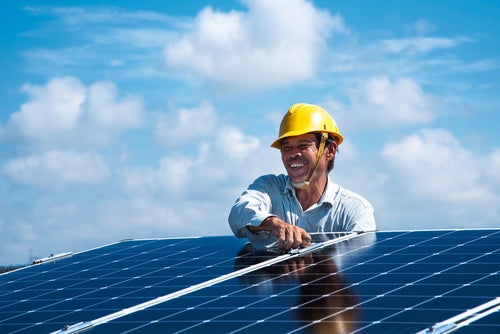
The joint renewable energy project is based on rooftop solar energy and will use an aggregated procurement approach to use clean energy within the Vietnam apparel supply chain.
A number of apparel brands, including H&M Group, New Balance, Arc’teryx, Columbia, Gap Inc., Icebug, lululemon and Target Corporation are also taking part in this renewable energy pilot project that aims to bring together 10 to 20 manufacturing suppliers into a group request for proposals (RFP) process for rooftop solar solutions in Vietnam.

Discover B2B Marketing That Performs
Combine business intelligence and editorial excellence to reach engaged professionals across 36 leading media platforms.
The philanthropic funders, HSBC Holdings plc. and IDH – The Sustainable Trade Initiative, are supporting the development and dissemination of publicly-available apparel sector tools and resources created through this project.
This Aii-CEIA-IDH partnership will be used to develop a publicly available methodology, best practices, and knowledge products (tools, templates, etc.) to enable deeper knowledge sharing and replication across the apparel industry supply chain in Vietnam, as well as in other targeted countries.
The partners explain that establishing a widely replicable model for scaling renewable energy across the apparel sector in key manufacturing countries will be a core goal of the project.
The Aii-CEIA-IDH partners believe transitioning manufacturing to clean energy is a key driver in the apparel industry’s ability to meet science based climate goals. But navigating complex procurement processes, dedicating capital, and arranging financing are barriers faced by many manufacturers exploring clean energy procurement.

US Tariffs are shifting - will you react or anticipate?
Don’t let policy changes catch you off guard. Stay proactive with real-time data and expert analysis.
By GlobalDataThe partners said: “An innovative solution is to aggregate suppliers’ clean energy procurement interests to drive procurement efficiencies through bundled demand, promote sharing of knowledge and best practices, and ultimately, significantly scale renewable energy use across the apparel supply chain. This concept is being put into practice through a new renewable energy pilot programme launching in Vietnam.”
All of the apparel companies involved in the project, said in a joint statement of support for the high-ambition power development planning in Vietnam:
“We, the undersigned, are a group of international and domestic companies doing business in Vietnam, and we encourage the Government of Vietnam to issue and implement a Power Development Plan VIII (“PDP8”) that prioritises renewable energy investment and accelerates Vietnam’s clean energy transition.”
The joint statement added: “Our companies hope clean energy investment and deployment will be prioritised in the Government of Vietnam’s power development planning and policy decisions through key elements, such as:
• Increased solar and wind energy targets to support Vietnam’s climate goals while advancing companies’ decarbonization efforts and broader investment opportunities.
• Expanded long-term mechanisms for corporate and industrial zone clean energy purchases including finalization of the Direct Power Purchase Agreement pilot program and a future regulation to make its provisions permanent.
• Greater emphasis on energy storage and flexibility solutions to increase clean energy utilisation and grid stabilisation.
• Expanded opportunities for private sector investment in grid infrastructure to ensure the build-out of a clean, reliable, resilient grid as energy demand in Vietnam grows.
• Reduced coal and natural gas targets to reduce reliance on imported fossil fuels and ensure clean, cost-effective sources of energy continue to grow in Vietnam.
• Accelerated progress toward a net-zero power system, including legislation that enshrines net-zero goals into law, to solidify Vietnam’s competitive advantage and leadership role.”
It concluded with a recommendation for the government of Vietnam to continue to prioritise ambitious clean energy targets through a supportive renewable energy policy landscape that enables expanded clean energy opportunities in Vietnam.
The brands and companies said they stand ready to partner with the government of Vietnam and supportive market stakeholders to unlock investment, achieve goals on an accelerated timeline, and scale Vietnam’s sustainable, resilient, and affordable energy transition.
The Apparel Impact Institute (Aii), the Clean Energy Investment Accelerator (CEIA), and IDH – The Sustainable Trade Initiative believe this collaborative approach to seeking rooftop solar solutions for several apparel manufacturers in one joint RFP will offer a number of benefits.
The benefits include:
- Process efficiencies that will save time for the brands and suppliers by using a standardised approach to site evaluation and RFP preparation.
- The solar vendors will see efficiencies due to the package of several pre-vetted customer sites offered in the RFP.
- Increased cost-savings are enabled for the apparel manufacturers, and better financing options are opened for the solar providers, thanks to economies of scale created by bringing together several megawatts of projects into one procurement.
- The aggregated procurement approach is expected to accelerate the decarbonisation of the industry and open the renewable energy procurement opportunity up to a wider range of sector stakeholders that might have previously been too small or under-resourced to secure attractive power purchase agreement (PPA) offers by themselves.
This partnership follows on from Vietnam’s recent announcement at COP26 that it will achieve net-zero emissions by 2050.



